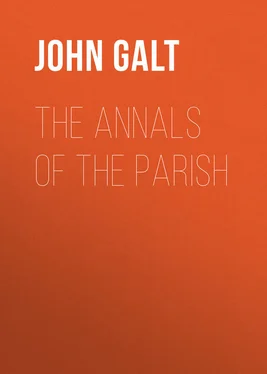John Galt - The Annals of the Parish
Здесь есть возможность читать онлайн «John Galt - The Annals of the Parish» — ознакомительный отрывок электронной книги совершенно бесплатно, а после прочтения отрывка купить полную версию. В некоторых случаях можно слушать аудио, скачать через торрент в формате fb2 и присутствует краткое содержание. Жанр: foreign_antique, foreign_prose, на английском языке. Описание произведения, (предисловие) а так же отзывы посетителей доступны на портале библиотеки ЛибКат.
- Название:The Annals of the Parish
- Автор:
- Жанр:
- Год:неизвестен
- ISBN:нет данных
- Рейтинг книги:3 / 5. Голосов: 1
-
Избранное:Добавить в избранное
- Отзывы:
-
Ваша оценка:
- 60
- 1
- 2
- 3
- 4
- 5
The Annals of the Parish: краткое содержание, описание и аннотация
Предлагаем к чтению аннотацию, описание, краткое содержание или предисловие (зависит от того, что написал сам автор книги «The Annals of the Parish»). Если вы не нашли необходимую информацию о книге — напишите в комментариях, мы постараемся отыскать её.
The Annals of the Parish — читать онлайн ознакомительный отрывок
Ниже представлен текст книги, разбитый по страницам. Система сохранения места последней прочитанной страницы, позволяет с удобством читать онлайн бесплатно книгу «The Annals of the Parish», без необходимости каждый раз заново искать на чём Вы остановились. Поставьте закладку, и сможете в любой момент перейти на страницу, на которой закончили чтение.
Интервал:
Закладка:
CHAPTER I
YEAR 1760
The Anno Domini one thousand seven hundred and sixty, was remarkable for three things in the parish of Dalmailing. – First and foremost, there was my placing; then the coming of Mrs. Malcolm with her five children to settle among us; and next, my marriage upon my own cousin, Miss Betty Lanshaw, by which the account of this year naturally divides itself into three heads or portions.
First, of the placing. – It was a great affair; for I was put in by the patron, and the people knew nothing whatsoever of me, and their hearts were stirred into strife on the occasion, and they did all that lay within the compass of their power to keep me out, insomuch, that there was obliged to be a guard of soldiers to protect the presbytery; and it was a thing that made my heart grieve when I heard the drum beating and the fife playing as we were going to the kirk. The people were really mad and vicious, and flung dirt upon us as we passed, and reviled us all, and held out the finger of scorn at me; but I endured it with a resigned spirit, compassionating their wilfulness and blindness. Poor old Mr. Kilfuddy of the Braehill got such a clash of glar on the side of his face, that his eye was almost extinguished.
When we got to the kirk door, it was found to be nailed up, so as by no possibility to be opened. The sergeant of the soldiers wanted to break it, but I was afraid that the heritors would grudge and complain of the expense of a new door, and I supplicated him to let it be as it was: we were, therefore, obligated to go in by a window, and the crowd followed us in the most unreverent manner, making the Lord’s house like an inn on a fair day, with their grievous yellyhooing. During the time of the psalm and the sermon, they behaved themselves better, but when the induction came on, their clamour was dreadful; and Thomas Thorl, the weaver, a pious zealot in that time, he got up and protested, and said, “Verily, verily, I say unto you, he that entereth not by the door into the sheepfold, but climbeth up some other way, the same is a thief and a robber.” And I thought I would have a hard and sore time of it with such an outstrapolous people. Mr. Given, that was then the minister of Lugton, was a jocose man, and would have his joke even at a solemnity. When the laying of the hands upon me was adoing, he could not get near enough to put on his, but he stretched out his staff and touched my head, and said, to the great diversion of the rest, “This will do well enough, timber to timber;” but it was an unfriendly saying of Mr. Given, considering the time and the place, and the temper of my people.
After the ceremony, we then got out at the window, and it was a heavy day to me; but we went to the manse, and there we had an excellent dinner, which Mrs. Watts of the new inns of Irville 2 2 Irvine, Ayrshire.
prepared at my request, and sent her chaise-driver to serve, for he was likewise her waiter, she having then but one chaise, and that no often called for.
But, although my people received me in this unruly manner, I was resolved to cultivate civility among them, and therefore, the very next morning I began a round of visitations; but, oh! it was a steep brae that I had to climb, and it needed a stout heart. For I found the doors in some places barred against me; in others, the bairns, when they saw me coming, ran crying to their mothers, “Here’s the feckless Mess-John!” and then, when I went into the houses, their parents wouldna ask me to sit down, but with a scornful way, said, “Honest man, what’s your pleasure here?” Nevertheless, I walked about from door to door like a dejected beggar, till I got the almous deed of a civil reception – and who would have thought it? – from no less a person than the same Thomas Thorl that was so bitter against me in the kirk on the foregoing day.
Thomas was standing at the door with his green duffle apron, and his red Kilmarnock nightcap – I mind him as well as if it was but yesterday – and he had seen me going from house to house, and in what manner I was rejected, and his bowels were moved, and he said to me in a kind manner, “Come in, sir, and ease yoursel’: this will never do, the clergy are God’s gorbies, and for their Master’s sake it behoves us to respect them. There was no ane in the whole parish mair against you than mysel’; but this early visitation is a symptom of grace that I couldna have expectit from a bird out the nest of patronage.” I thanked Thomas, and went in with him, and we had some solid conversation together, and I told him that it was not so much the pastor’s duty to feed the flock, as to herd them well; and that, although there might be some abler with the head than me, there wasna a he within the bounds of Scotland more willing to watch the fold by night and by day. And Thomas said he had not heard a mair sound observe for some time, and that, if I held to that doctrine in the poopit, it wouldna be lang till I would work a change. – “I was mindit,” quoth he, “never to set my foot within the kirk door while you were there; but to testify, and no to condemn without a trial, I’ll be there next Lord’s day, and egg my neighbours to be likewise, so ye’ll no have to preach just to the bare walls and the laird’s family.”
I have now to speak of the coming of Mrs. Malcolm. – She was the widow of a Clyde shipmaster, that was lost at sea with his vessel. She was a genty body, calm and methodical. From morning to night she sat at her wheel, spinning the finest lint, which suited well with her pale hands. She never changed her widow’s weeds, and she was aye as if she had just been ta’en out of a bandbox. The tear was aften in her e’e when the bairns were at the school; but when they came home, her spirit was lighted up with gladness, although, poor woman, she had many a time very little to give them. They were, however, wonderful well-bred things, and took with thankfulness whatever she set before them; for they knew that their father, the breadwinner, was away, and that she had to work sore for their bit and drap. I dare say, the only vexation that ever she had from any of them, on their own account, was when Charlie, the eldest laddie, had won fourpence at pitch-and-toss at the school, which he brought home with a proud heart to his mother. I happened to be daunrin’ by at the time, and just looked in at the door to say gude-night: it was a sad sight. There was she sitting with the silent tear on her cheek, and Charlie greeting as if he had done a great fault, and the other four looking on with sorrowful faces. Never, I am sure, did Charlie Malcolm gamble after that night.
I often wondered what brought Mrs. Malcolm to our clachan, instead of going to a populous town, where she might have taken up a huxtry-shop, as she was but of a silly constitution, the which would have been better for her than spinning from morning to far in the night, as if she was in verity drawing the thread of life. But it was, no doubt, from an honest pride to hide her poverty; for when her daughter Effie was ill with the measles – the poor lassie was very ill – nobody thought she could come through, and when she did get the turn, she was for many a day a heavy handful; – our session being rich, and nobody on it but cripple Tammy Daidles, that was at that time known through all the country side for begging on a horse, I thought it my duty to call upon Mrs. Malcolm in a sympathising way, and offer her some assistance, but she refused it.
“No, sir,” said she, “I canna take help from the poor’s-box, although it’s very true that I am in great need; for it might hereafter be cast up to my bairns, whom it may please God to restore to better circumstances when I am no to see’t; but I would fain borrow five pounds, and if, sir, you will write to Mr. Maitland, that is now the Lord Provost of Glasgow, and tell him that Marion Shaw would be obliged to him for the lend of that soom, I think he will not fail to send it.”
Читать дальшеИнтервал:
Закладка:
Похожие книги на «The Annals of the Parish»
Представляем Вашему вниманию похожие книги на «The Annals of the Parish» списком для выбора. Мы отобрали схожую по названию и смыслу литературу в надежде предоставить читателям больше вариантов отыскать новые, интересные, ещё непрочитанные произведения.
Обсуждение, отзывы о книге «The Annals of the Parish» и просто собственные мнения читателей. Оставьте ваши комментарии, напишите, что Вы думаете о произведении, его смысле или главных героях. Укажите что конкретно понравилось, а что нет, и почему Вы так считаете.












